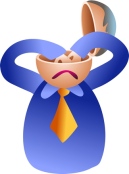 Years ago, I used to teach public relations courses called Reputation Management to corporate suits. When I singled out companies that had somehow managed to weather bad press to emerge with reputations well intact, there was one at the top.
Years ago, I used to teach public relations courses called Reputation Management to corporate suits. When I singled out companies that had somehow managed to weather bad press to emerge with reputations well intact, there was one at the top.
That company poster child was, hands down, Johnson & Johnson.
In fact, for many years the Forbes list of 100 Most Admired Companies featured J&J as their perennial list-topper. And the exemplary way the company had swiftly stick-handled its catastrophic Tylenol murders scandal in 1982 continues to be taught in PR, journalism and crisis communications classes.
But those heady days must seem far, far away now, with increasing reports of tainted J&J drug recalls. As Consumer Reports Health describes it, a nauseatingly bad smell to its products has been blamed for stinking up several different types of Tylenol, the antipsychotic drug Risperdal, HIV/AIDS drug Prezista, and two lots of the anti-epilepsy drug Topamax among many others. In fact, the agency reports that recalls like these have cost J&J almost $900 million in sales last year alone. Continue reading

 In essence,
In essence,  Here’s more this month from investigative journalist
Here’s more this month from investigative journalist 
 I’ve picked up lots of corporate swag at conferences and trade shows during my PR days, but free ballpoint pens or cheap fridge magnets can hardly compete with the really good swag that other people seem to get. Consider for example what was handed out to sports photographers covering the February Olympic Winter Games in Vancouver/Whistler this year: an eye-catching coffee travel mug shaped exactly like a 70-200mm Canon L-series lens. Now that’s a very cool and potentially useful Olympics souvenir to bring home.
I’ve picked up lots of corporate swag at conferences and trade shows during my PR days, but free ballpoint pens or cheap fridge magnets can hardly compete with the really good swag that other people seem to get. Consider for example what was handed out to sports photographers covering the February Olympic Winter Games in Vancouver/Whistler this year: an eye-catching coffee travel mug shaped exactly like a 70-200mm Canon L-series lens. Now that’s a very cool and potentially useful Olympics souvenir to bring home. It was like something out of the movie Michael Clayton – only with Big Pharma as the villain: a Pfizer drug rep sporting a severe black suit and taking cell phone pictures of students protesting Harvard Medical School’s ties to the drug industry. Staged last October, the Boston gathering was sparsely attended, with a few students holding signs and a petition delivered to an empty office (the dean was out of town).
It was like something out of the movie Michael Clayton – only with Big Pharma as the villain: a Pfizer drug rep sporting a severe black suit and taking cell phone pictures of students protesting Harvard Medical School’s ties to the drug industry. Staged last October, the Boston gathering was sparsely attended, with a few students holding signs and a petition delivered to an empty office (the dean was out of town).